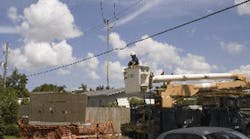Across the country, utility companies are marshalling line crews and convoys of trucks for service in storm-struck areas of Louisiana, Mississippi, and Alabama to help restore power to thousands of communities ravaged by perhaps the worst natural disaster to ever hit the U.S., Hurricane Katrina.
Louisiana power company Entergy has reported that just under one-million customers remain without power in Louisiana and Mississippi as restoration efforts are extremely limited at this point, largely due to the scope and amount of damage to its electrical system. Entergy's electrical power outages from Katrina peaked at nearly 1.1-million homes and businesses, with some 790,000 in Louisiana and more than 300,000 in Mississippi.
Despite committing 4,000 line workers and thousands of other crews as well as contract workers from neighboring companies, Entergy said it expects a long and difficult restoration in the aftermath of the extensive damage caused by Katrina.
“This is an effort that is going to go on for weeks if not months,” Carol Peters, spokeswoman for Dallas-based utility TXU told FleetOwner. “We expect it will take six to 12 weeks at minimum to start restoring power, but we can’t begin to restore electric service until the human relief efforts are completed.”
Peters said TXU sent 570 employees and contractors to Florida where Katrina first made landfall and is now in the process of redirecting them to Louisiana and Mississippi. “We have 55 pieces of equipment – from bucket trucks to tree trimmers, communication trailers and other units – already deployed, but they need to rest as they are on a two-week rotation,” she said. “Our crews work long hours in emergency situations like this and they can only sustain that workload so long before they need to be rotated.”
“Hurricane Katrina caused extensive damage in Florida before striking the coast lines of Louisiana, Mississippi, and Alabama,” said Brenda Pulis, senior vp for TXU Electric Delivery. “In June 2004, when we experienced the most devastating storm in our history, utilities from nine states came through for us, so we’re responding to Entergy and Florida Power & Light by sending some of the most experienced, skilled people. Utilities have traditionally worked together during emergencies.”
“Along with Southern Mississippi and surrounding areas, Mississippi Power has suffered the worst catastrophe in our company’s history,” said Anthony Topazi, the company’s president and CEO. “We mourn the loss of life and pray for the families who have suffered from this tragedy. Thousands of additional personnel are poised and ready to assist our employees in beginning the work of rebuilding our electric system.”
“To support our employees in the restoration effort, more than 2,000 additional workers from outside the company will begin arriving today,” said Kurt Brautigam, a spokesman for Mississippi Power. “They’ll be able to help us begin restoring service to essential customers such as hospitals and public safety agencies. We’ll also have tree-trimming crews arriving to begin making way for the main rebuilding process.”
Louisiana and Mississippi, though hit the hardest by Katrina, aren’t the only states affected. As of 4 a.m. today, 335,036 customers in Alabama Power’s service territory remained without power. Katrina is the second-worst storm in Alabama Power history in terms of outages, right behind Hurricane Ivan, which left more than 825,000 customers without power in September 2004.
Although Alabama Power crews have already restored power to nearly half the customers who lost power during Katrina, company officials warn that remaining outages may take longer to restore. To that end, crews from utilities as far away as New York, New Jersey, Massachusetts, Ohio and Oklahoma are moving in to help support restoration efforts.
Alfonso Quiroz, spokesman for New York-based Consolidated Edison, told FleetOwner that ConEd is sending 10 seasoned crews made up of 30 all-volunteer employees and necessary equipment to help jump-start recovery efforts in Alabama.
“They left on Aug. 30 and we’re not even sure what they’ll encounter, so there is no time schedule at this point as to how long they’ll be there,” Quiroz said. “They are all experts at overhead line work and they’ve done this kind of restoration work before, most notably last year in Florida. They feel strongly about helping people recover from these kinds of severe storms so they are going to do what they can to help restore the power.”
Melissa McHenry, spokeswoman for Ohio-based American Electric Power (AEP) told FleetOwner that her company has released to Louisiana 1,250 employees and contractors plus their equipment to help with recovery efforts.
“Obviously, the utilities in the areas hit by Katrina don’t have any spare equipment left so our crews are taking everything they will need – they are going to be self-contained units,” McHenry said. “Convoys are leaving our area compromised of bucket trucks, tree trimmers, four-wheel-drive light vehicles and others – everything they’ll need to help get the power back on.”




